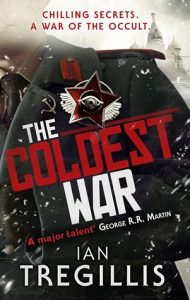The Coldest War by Ian Tregillis
 I was persuaded to read the first Milkweed novel, Bitter Seeds, a while ago, and although I found it a decent read it left me sceptical as to where exactly this trilogy was headed. After finishing The Coldest War I can hardly wait to find out.
I was persuaded to read the first Milkweed novel, Bitter Seeds, a while ago, and although I found it a decent read it left me sceptical as to where exactly this trilogy was headed. After finishing The Coldest War I can hardly wait to find out.
Set in 1963, The Coldest War takes place in the same alternate history as Bitter Seeds. The main events occur almost twenty years after the first book; the Soviets are now on the verge of winning the Cold War, having made use of the devastating Nazi scientific secrets stolen at the end of the first book. The characters themselves are almost unrecognisable. Each of them is in a dark place: Marsh’s marriage has degenerated into a resentful partnership that revolves around caring for a disabled son; Will is burdened by guilt and memories; and Klaus is imprisoned in a Soviet research facility along with his psychotic sister Gretel. All are shadows of their former selves, which makes for quite a gloomy kick-off to the story. However, the more time we spend with the characters the more we see them regain their old fire; and the further they’re dragged back into Milkweed, the more exciting their circumstances become.
It’s not until later that it’s revealed just how many of these circumstances have arisen as a direct result of a certain character’s manipulations in the first book. I really wish I’d gone back to re-read Bitter Seeds before beginning The Coldest War, since reading them back-to-back is probably the best way to appreciate the author’s skilful use of timelines, not to mention the subtle set-ups and spectacular payoffs. The jaw-dropping ending actually had me racing upstairs to find Bitter Seeds and then flipping through the pages looking for one scene in particular, after which my jaw dropped and for several seconds I was literally speechless. The first book planted so many seeds (book two really gave ‘bitter seeds’ a whole new meaning) and I can’t wait to see how everything plays out in the final instalment, Necessary Evil. My only criticism is feeling that the Eidolon storyline didn’t mesh particularly well with the rest of the story, although its significance in the greater events of the trilogy is made abundantly (and terrifyingly) clear by the end of the novel.
Despite this I absolutely LOVED this book. The Coldest War is awesome and exciting, and I already look forward to re-reading the whole trilogy in the future.
